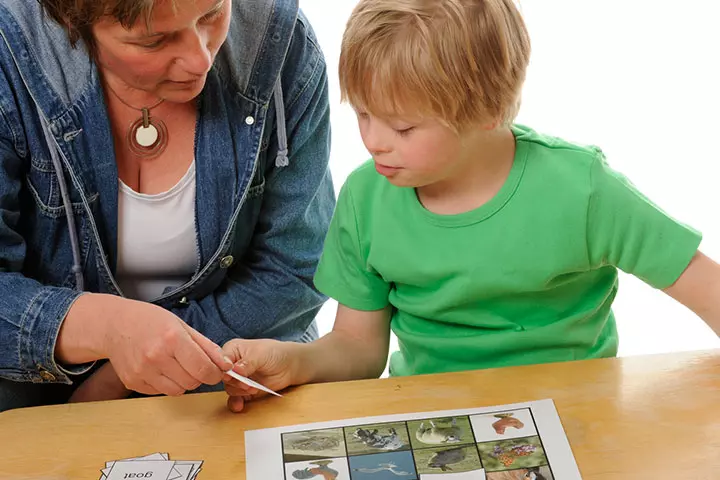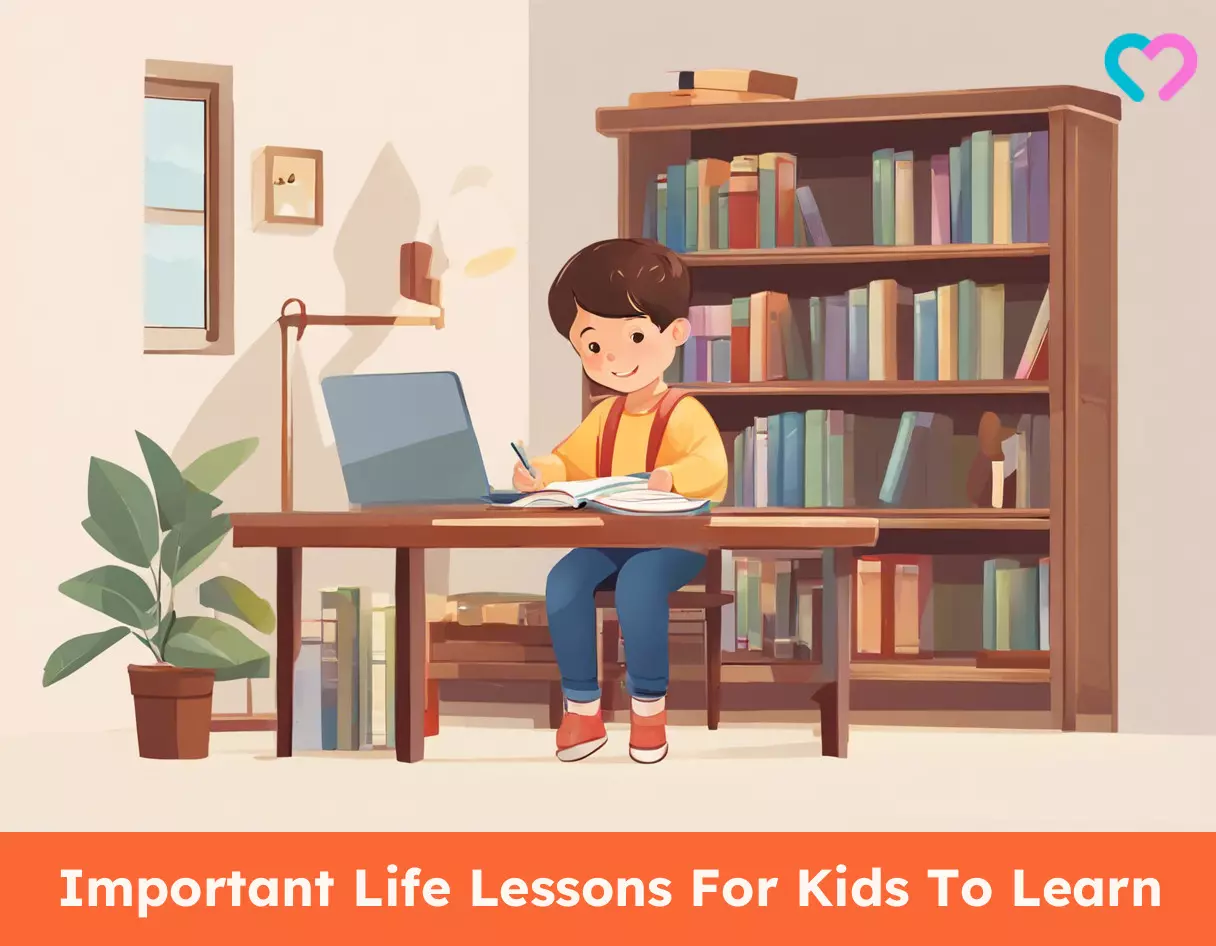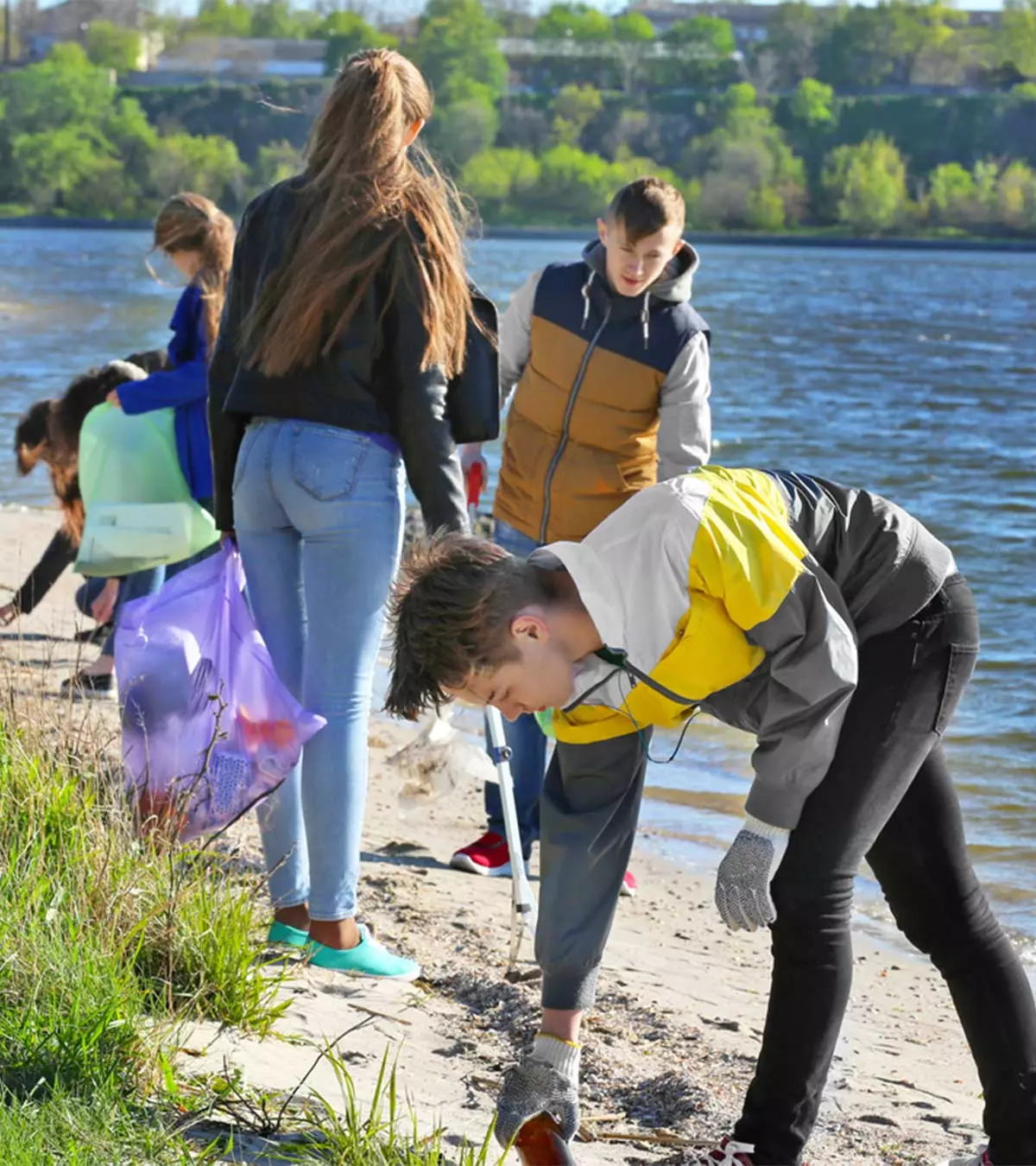
Image: Shutterstock
It is important to train your children in a way so that they can stand up for themselves and learn independence. Life lessons for kids are essential because they equip them with the skills they need to tackle life’s challenges. These skills build their character and develop their emotional intelligence, both of which are crucial for navigating social situations and personal growth. This post on teaching important lessons and morals of life provides more information in this context. Parents are the first and the biggest role models in their child’s life. Whatever you do, your children will follow. Also, every parent aspires for their children’s growth and development in a loving, respected, and happy environment so that they may imbibe the same traits and cultivate an admirable character. Read on for a list of important life lessons you need to teach your child to help them lead a good and disciplined life.

Key Pointers
- Parents are the first role models for their children and can influence their actions in the future.
- Teaching life skills will not only make children strong but also prepare them to face challenges in life.
- Children should be taught to have a positive self-image and believe in themselves.
- Children should be taught to forgive others and maintain healthy relationships.
- Encourage children to work hard, never stop learning, and show gratitude towards others.
10 Important Life Lessons For Kids To Learn
Learning life skills can not only strengthen a person but also equip them to deal with the challenges of the world by developing self-awareness within themselves. Life skills can shape a child’s personality and behavior and help them interact positively with society. Teaching kids practical life skills helps them become independent and self-sufficient. These skills boost confidence, making children feel more capable of handling daily challenges. A strong sense of control over their lives can lead to greater happiness and well-being (1). There are plenty of life lessons that you can incorporate into your kids. Here we shall discuss eight good life lessons for kids in detail:
1. You deserve to be respected and loved
You must allow your kid to freely express their emotions while treating them with fairness and generosity. It’s important to shower them with love, build their self-esteem, and guide them to do the same for others. Your child considers you to be their biggest role model. How you act and what you expect will influence their actions in the future.
A blogger who goes by the nickname of Fabi Blogger recounts how her bond with her father had a lasting impact on her life. She says, “Dad once told me he would love me no matter what, and that’s exactly what he did. He loved me and everyone around him with all his heart (i).”
 Quick tip
Quick tip2. Challenges will make you stronger

You must teach your kid that challenges make them strong, and it gives them a chance to develop as better humans. For instance, you must not rush to rescue them when they have trouble drawing something. Instead, allow them to figure out the problem. This will help them enhance their skills, such as perseverance, resilience, and problem-solving, and also help them gain leadership skills and become a better person.
3. You are what you think of yourself
You must not say anything negative about yourself in front of your kids. Don’t say how ‘lazy’ or ‘stupid’ you are at times. Your child may begin to mimic your negative thinking if you do not maintain honesty and integrity. Setting intentional goals for yourself and teaching your child the rules of adaptability and patience is important. Also, showing your child how to achieve these goals will give them a better understanding.
4. We are all humans, we make mistakes
You must teach them that we tend to have bad days at times and that we all can make mistakes. We get distracted by issues or it is just the differences in opinion that matter.
5. Be friendly, forgive others

Teach your child how to assist someone through a mistake or problem. It’s important to let your child observe your positive interactions with friends. For instance, demonstrate how to ask for emotional support when you’ve had a tough day, be understanding and show empathy, compassion, and forgiveness towards others’ emotions and issues. Teaching kids forgiveness helps them build strong relationships and develop emotional resilience. Research shows that children as young as four forgive more easily when they receive an apology. Learning to forgive boosts self-esteem, reduces social anxiety, and improves overall well-being (2).
 Do remember
Do remember6. Hard work pays
Life is not all about fun, there are challenges in each step that must be handled with diligence and confidence. Show your kid there are so many things you do not just because you ‘like’, but you expect long-term gains from them. Show examples of works that are not always your favorite, but you still do them because of the better life you dream of.
A computer professional, Steve Hughes, recounts how his father played a huge role in understanding the importance of hard work in his life. He says, “I am so thankful for his example and practical nature. I can definitely say that I am where I am in my career because of the work ethic he instilled in me (ii).”
 Quick tip
Quick tip7. You must never stop learning

We do not stop learning even when we are old. There are endless sources for gaining knowledge, education, and understanding of various aspects of life. Also, our personal experiences serve as invaluable sources of learning, which augment our creativity and wisdom. Therefore, to help your child learn new things, you need to be an active learner yourself and to engage with your child’s interests and curiosity actively.
8. Be grateful to others

You must encourage your kid to say ‘thank you’ when others show kindness to them or their family. Teach your kid to contribute to the household or the community, be it simple things like picking up from the laundry. Expressing gratitude helps children develop a positive outlook and stronger relationships. Research shows that grateful individuals experience greater happiness, life satisfaction, and motivation for self-improvement. Practicing gratitude can also improve sleep, lower stress, and benefit overall well-being (3).
9. Good manners always helps
Explain to your child how good manners can help them develop and maintain good relationships. Tell them the importance of the five golden words: ‘Thank you,’ ‘Please,’ ‘Sorry,’ ‘Excuse me,’ and ‘You’re welcome.’ Opening doors or offering your seat to seniors or elders, exchanging pleasantries, seeking permission before using others belongings, and offering help to those in need creates a good impression. Good manners can create a happy and friendly atmosphere for them.
10. Learn to speak less and listen more
Teach your children the importance of listening attentively. When your child learns to be patient and listen to what others say, they learn new things and build new connections. They learn to empathize with others and become better conversationalists. Lastly, by listening attentively, they also show their respect for others.
Above all, you should teach mindfulness to your children while reminding them that you will always be there for them and ready to help them when needed. Encourage your child to cultivate optimism and humility, and maintain a positive frame of mind, so they can easily overcome the challenges they may encounter.
Frequently Asked Questions
1. What life lessons can I learn in school?
Connecting with others, which means working with and for others, is an important life lesson taught in school. It also involves improving communication skills, coping with stress, and solving problems. Planning or setting goals for yourself and working towards them are other life lessons that schools can teach (4).
2. What are life skills lessons?
Life skills for kids can help you in your interactions with the world and make the most of your life. According to UNICEF, “behavior development consists of balancing attitude, knowledge, and skills.” There are three major categories: critical thinking, communication skills, and self-management skills (5).
3. What is the importance of hard work and perseverance in life?
As they say, ‘perseverance is the key to success.’ Perseverance means to never give up despite the many obstacles you face in life. The only way to succeed and reach the top is by consistently working hard and continuing on your path to reach your ultimate goal no matter what.
4. How can self-confidence and self-esteem help me achieve my goals and dreams?
A person with self-confidence and self-esteem believes in themselves and their capabilities. Those with these characteristics tend to have a positive mindset, which helps them take risks and work towards their goals and dreams. Moreover, they are not afraid to step out of their comfort zone and test their strengths and weaknesses.
5. How can mindfulness and gratitude help me appreciate the present moment and find happiness?
Mindfulness can help you reduce stress levels, manage negative emotions and reactions, as well as have a deeper understanding of your feelings. Gratitude enables you to appreciate the good things in life, no matter how small. This practice helps you find joy in the little things and gives you a sense of fulfillment.
6. Why is it important to be open-minded and respectful towards different perspectives and cultures?
Being open-minded and accepting of other cultures and perspectives helps you grow as a person. Also, experiencing different cultures allows you to grow emotionally and mentally. Furthermore, it can make you a better person by instilling empathy and understanding. Lastly, respecting different cultures can help one overcome prejudice and bias.
7. How can failures and mistakes be opportunities for learning and growth?
As the saying goes, ‘Failure is the stepping stone to success,’ failure provides us with opportunities to look back and understand what went wrong. It helps us find room for improvement and allows us to become resilient. Through setbacks and failures, we understand our weaknesses and make room for growth.
8. How can communication skills help me express myself effectively and build strong connections with others?
Communication is one of the most essential tools for building relationships. Honing your communication skills can give you clarity of thought and help you express your feelings better. In addition, good communication skills are helpful when resolving conflicts and allow you to build meaningful connections.
Life lessons for kids are an essential part of growing into independent individuals. They teach children that they deserve and should give respect and love, and they should freely express their emotions and thoughts. Teaching them the importance of challenges in life, as well as skills such as decision-making, handling failures and mistakes, and forgiveness, can help enhance their social skills and emotional intelligence. Additionally, parents or caregivers should help them understand the values of hard work and time-management and encourage and provide opportunities for them to self-learn life lessons. Furthermore, encouraging your child to express gratitude and be kind and grateful to others from a young age can be beneficial.
Infographic: Essential Life Lessons To Teach Children
Parents have an important responsibility to teach their children life lessons. These lessons may have a significant effect on their developing minds. They will blossom in the future and develop positive relationships with others. Here is an infographic with some important life lessons you may teach your children. Check out! Illustration: Momjunction Design Team
Illustration: Important Life Lessons For Kids To Learn

Image: Stable Diffusion/MomJunction Design Team
As an integral part of positive reinforcements, it is also essential to outline the proper instructions. Teach your children some important life lessons as part of their development.
Personal Experience: Sources
MomJunction articles include first-hand experiences to provide you with better insights through real-life narratives. Here are the sources of personal accounts referenced in this article.
i. The Greatest Life Lessons My Father Taught Me.https://wonderfabi.wordpress.com/2018/01/30/the-greatest-life-lessons-my-father-taught-me/
ii. Work Ethic and Family – A Tribute to My Parents.
https://dataonwheels.wordpress.com/2014/01/09/work-ethic-and-family-a-tribute-to-my-parents/
References
- The Importance of Teaching Life Skills at a Young Age.
https://www.familymeans.org/articles/2025/09/22/the-importance-of-teaching-life-skills-at-a-young-age/ - 3 Research-Backed Tips for Teaching Forgiveness to Children.
https://www.chconline.org/resourcelibrary/3-research-backed-tips-for-teaching-forgiveness-to-children/ - Stop telling your kids to be grateful. Show them how instead.
https://www.apa.org/topics/parenting/cultivating-gratitude-kids - Life lessons after classes: investigating the influence of an afterschool sport program on adolescents’ life skills development.
https://www.ncbi.nlm.nih.gov/pmc/articles/PMC5421366/ - Module 7 Life Skills.
https://www.unodc.org/pdf/youthnet/action/message/escap_peers_07.pdf
Community Experiences
Join the conversation and become a part of our nurturing community! Share your stories, experiences, and insights to connect with fellow parents.
Read full bio of Catherine Mok
Read full bio of Harshita Makvana
Read full bio of Deepa Thomas
Read full bio of Kavita Kankani

















